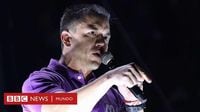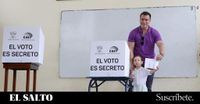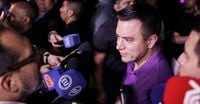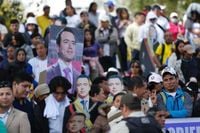In a decisive victory, Daniel Noboa was re-elected as the president of Ecuador on Sunday, April 13, 2025, garnering nearly 56% of the votes against his opponent Luisa González, who received just over 44%. The election results, confirmed by the National Electoral Council (CNE), have sparked controversy as González, a candidate from the leftist party Revolución Ciudadana, has alleged electoral fraud and has stated that she does not recognize the outcome.
Speaking from his beachfront residence in Olón, Noboa expressed gratitude to his supporters and emphasized the importance of the electoral process. "Today, Ecuador has voted for a young president who has worked to improve the lives of Ecuadorians," he said. Noboa's victory marks a significant moment in Ecuador's political landscape, as it effectively halts the potential return of correísmo, the political movement led by former president Rafael Correa.
The CNE president, Diana Atamaint, has defended the integrity of the election results, stating, "Democracy is strengthened when the voice of the people is respected." She confirmed that the results were irreversible, despite González's claims of fraud. The former president Correa, who has been a polarizing figure in Ecuadorian politics, supported González's allegations, stating that the results were implausible.
González's campaign was marked by her assertion that the election process was tainted. She declared, "Ecuador is living a dictatorship and we are experiencing the most grotesque electoral fraud in the history of the Republic." Following the announcement of the results, she vowed to request a recount from the CNE, citing her belief that the election was rigged.
Analysts have noted that González's claims of fraud are questionable given the significant margin of victory. Political analyst Pablo Medina remarked that while irregularities exist in every election, the scale of fraud suggested by González is unlikely. He noted that Noboa's win, with over a million votes separating the candidates, reflects a clear mandate from the electorate.
In the run-up to the election, Noboa faced challenges including rising violence and economic instability. January 2025 was recorded as the most violent month in Ecuador's history, with 793 homicides reported. Noboa's administration has adopted a tough stance on crime, incorporating military forces into public security and declaring states of emergency in response to escalating violence.
Despite these challenges, Noboa's approval ratings remained relatively stable, with many citizens perceiving his aggressive security measures as necessary. His administration has also faced criticism for its handling of the security crisis, particularly following a controversial police raid on the Mexican embassy to arrest former vice president Jorge Glas, leading to diplomatic tensions.
Looking ahead, Noboa's government will need to navigate a fragmented legislative landscape, with the majority of the National Assembly aligned with correísmo. Political analyst Andrea Suárez believes that Noboa's substantial victory provides him with an opportunity to legitimize his presidency and pursue his agenda. However, she cautions that high public expectations will demand immediate action on pressing issues such as security and economic recovery.
In his victory speech, Noboa outlined his vision for Ecuador, stating, "Ecuador is changing. It has chosen a different path, and that path will ensure that our children live better than we do." He expressed a commitment to drafting a new constitution to replace the current one established in 2008 during Correa's presidency, aiming to facilitate reforms in crime prevention and economic liberalization.
The election was marked by a high voter turnout of 83.76%, reflecting the public's engagement in the democratic process. Celebrations erupted in cities across Ecuador, with supporters of Noboa taking to the streets in jubilant displays of patriotism.
International reactions to Noboa’s victory have been largely positive. The Organization of American States (OEA) congratulated him, citing the election's adherence to democratic norms. Former Ecuadorian presidents, including Lenín Moreno and Guillermo Lasso, also offered their congratulations, wishing him success in his new term.
As Noboa prepares for his second term, he faces the dual challenge of fulfilling the promises of his campaign while addressing the ongoing crises that have plagued Ecuador. His approach to governance will be closely scrutinized, particularly as he seeks to implement significant reforms in a politically divided environment.
In conclusion, the re-election of Daniel Noboa represents a pivotal moment for Ecuador, potentially reshaping its political landscape and addressing the pressing issues of crime and economic instability. As the nation moves forward, the implications of this election will resonate in the years to come.









